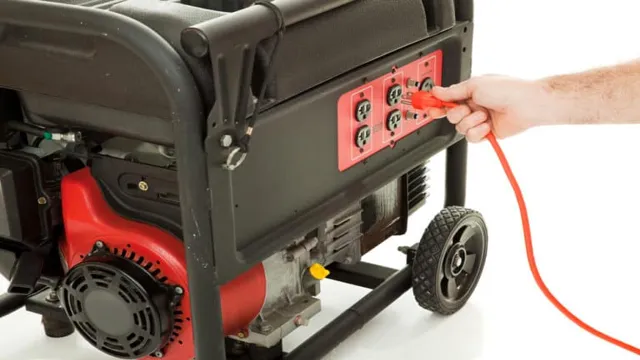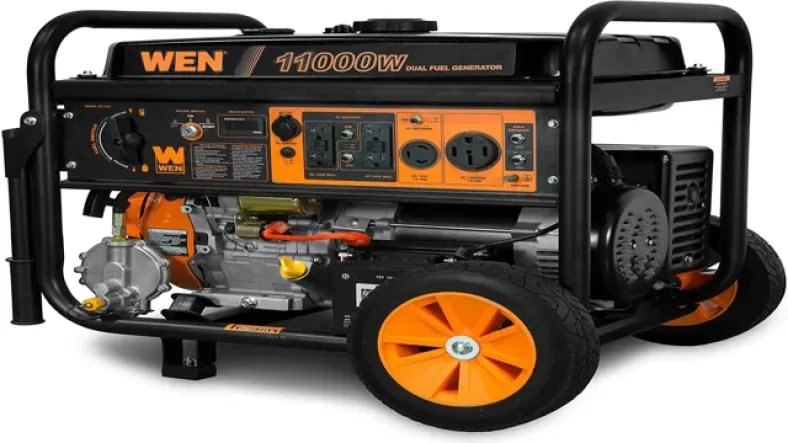Generators are an essential part of modern living in case power goes out. Whenever there’s a natural disaster, or the power lines are down due to heavy storms or maintenance work, generators come to the rescue, powering all essential appliances for your comfort. But, for how long can generators run without needing refueling? This is a vital question because you don’t want to be caught in the middle of a power outage with no electricity back up.
Stick around, and we’ll answer this critical question, so you’re always prepared.
Introduction
If you’re someone who often relies on a generator for power, you may be wondering how long a generator can run for. Well, the answer to that question depends on several factors, such as the size of the generator, the type of fuel it uses, and how much power you’re drawing from it. In general, most portable generators can run for around 8-12 hours at 50% load on a full tank of gas.
However, with a larger stationary generator, you could potentially get up to 24-48 hours or more of continuous power, depending on the fuel source and the amount of power being used. It’s worth noting though, that generators should never be run continuously for extended periods of time without regular maintenance and refueling. To ensure that your generator remains in good working order and to avoid any potential safety hazards, it’s recommended that you follow the manufacturer’s guidelines for usage and maintenance.
The Basics of Generator Runtime
Generator runtime is an essential aspect of any generator system and can greatly impact its efficiency, performance, and lifespan. Understanding generator runtime is crucial for maintaining and maximizing the output of your generator and avoiding any potential damage. In simple terms, generator runtime refers to the amount of time a generator is operational and producing power.
The runtime of a generator can vary based on factors such as fuel type, load demand, and maintenance schedules. By monitoring and managing generator runtime effectively, you can ensure that your generator is functioning optimally, and you are getting the maximum amount of power output for your needs.

Factors that Affect Generator Runtime
Generator Runtime. Generators are an essential part of any power backup plan. Whether you are working in the industrial sector or managing a commercial property, generators serve as lifesavers during power outages.
However, the runtime of a generator depends on several factors, each of which can affect the overall functionality of the generator. These factors can include the size, type, and capacity of the generator, the load demand, the fuel type, the climate, and maintenance requirements. It is vital to keep in mind that these factors can significantly impact the runtime of a generator, and one must consider them before purchasing a generator.
Understanding the impact of these factors on generator runtime can ensure optimal performance and longevity of your generator.
Types of Generators and Runtime
Generators come in many types, and the runtime varies depending on the generator’s size and fuel type. Gasoline-powered generators are the most common and usually run for about 8-12 hours on a full tank. Larger generators with more power can run for up to 24 hours, and some high-quality models run for up to 48 hours.
Propane-powered generators are becoming more popular due to their convenience and long run time. They can run for up to 72 hours on one tank of propane. Diesel generators are also an option and are known for their durability and longer lifespan.
These generators can run for up to 500 hours on a full tank, making them ideal for use in remote areas where power loss is common. However, it’s important to note that the runtime of a generator will be affected by the load it’s powering, so it’s always a good idea to check the generator’s specifications before purchasing. In conclusion, there are various types of generators with different runtimes depending on the fuel type and the generator’s size.
Portable Generators
Portable generators are a versatile and convenient way to generate electricity on the go. There are two main types of portable generators – conventional and inverter. Conventional generators are generally more powerful and can handle higher wattage loads, making them a better choice for power-hungry appliances like air conditioners and refrigerators.
Inverter generators, on the other hand, are more efficient and quieter, making them a better choice for camping trips or other outdoor activities where noise pollution may be a concern. When it comes to runtime, the capacity of the fuel tank and the efficiency of the generator determine how long it can run. A typical portable generator can run for up to 12 hours on a single tank of fuel, but this can vary depending on the load and the generator’s fuel efficiency.
Some generators also have features that help to extend their run time, such as automatic shutoff when the oil level is low, idle control, and fuel gauge systems. Ultimately, the type of portable generator and its runtime will depend on your specific needs and intended usage. Whether you need a generator for emergency backup power, camping trips, or outdoor events, there are a variety of options available to suit your needs.
When choosing a generator, it’s important to consider factors such as power output, noise level, fuel efficiency, and ease of use to find the best generator for your needs.
Standby Generators
Standby generators are essential for homes and businesses that need a reliable source of backup power in an emergency situation. There are two main types of standby generators: air-cooled and liquid-cooled. Air-cooled generators are typically less expensive and designed for smaller applications, while liquid-cooled generators are often more powerful and used for larger-scale systems.
When it comes to runtime, standby generators vary based on their fuel source and capacity. Generators fueled by natural gas or propane tend to have longer runtimes than those fueled by diesel. It’s important to consider not just the wattage needed during an outage but also the length of time power may be out in your area.
A qualified electrician can help determine the appropriate size and type of generator needed for your specific needs. With a standby generator in place, you’ll have peace of mind knowing your home or business is prepared for any emergency power needs.
Inverter Generators
Inverter generators have become increasingly popular in recent years due to their efficiency and versatility. These generators work by converting DC power into AC power, making them a more efficient choice than traditional generators that produce AC power through an alternator. There are two main types of inverter generators: recreational and professional.
Recreational generators are designed for camping, tailgating, and other outdoor activities, while professional generators are meant for job sites and emergency backup power. The runtime of an inverter generator depends on the fuel capacity and load demand, meaning that a higher demand for power will result in a shorter runtime. However, inverter generators are generally more fuel-efficient than traditional generators, meaning you can run them for longer periods of time without needing to refuel.
Overall, inverter generators are a reliable and portable power source that can be used in a variety of situations.
Tips for Maximizing Generator Runtime
If you’ve ever experienced a power outage, you know how invaluable generators can be for keeping your home running smoothly. However, how long generators can run for depends on several factors, including the size of the fuel tank, the amount of power being used, and the type of fuel being used. To maximize your generator runtime, start by evaluating your fuel tank size and investing in a larger one if necessary.
You can also reduce the amount of power your generator needs to produce by unplugging non-essential appliances and devices. Avoid using energy-intensive appliances, such as air conditioners or electric heaters, and make sure to perform regular maintenance on your generator to keep it running efficiently. Remember, with proper care and attention, your generator can provide you with reliable power for an extended period.
So, instead of worrying about how long can generators run for, focus on maximizing your generator’s runtime with a few simple steps.
Maintenance and Upkeep
Generator runtime is dependent on various factors, including maintenance and upkeep. To ensure you get the most out of your generator, there are a few tips you can follow. Firstly, regular maintenance is key.
This includes inspecting and cleaning the unit, changing oil and filters, and monitoring fuel levels. Secondly, proper storage is crucial to ensure your generator remains in good condition. Always keep it in a dry, covered location away from moisture.
Thirdly, consider the load on the generator. Avoid overloading the unit, as this can cause it to shut down or even result in long-term damage. Lastly, using high-quality fuel and keeping the unit well-lubricated can also contribute to maximizing generator runtime.
By following these tips, you can ensure that your generator is always ready when you need it most.
Fuel Efficiency Strategies
When it comes to using a generator, maximizing its runtime can be a great way to save fuel and keep your costs down. To do this, there are a few tips that you can utilize to improve its efficiency. First off, make sure to choose the right size generator for your needs, as one that is too small will work harder and use more fuel than necessary.
Keep the generator well-maintained, which includes regularly changing the oil, air filter, and spark plug. Additionally, consider investing in a fuel stabilizer to prolong the life of the fuel and prevent it from going bad. Another strategy is to only run essential appliances when the generator is on, as powering unnecessary items will deplete the fuel faster.
Lastly, be mindful of the weather and temperature, as hot climates can also decrease the generator’s efficiency. By following these tips and implementing fuel efficiency strategies, you can get the most out of your generator while keeping your costs low.
Conclusion
In short, generators can run for as long as there is fuel and maintenance. But, one must remember that generators are like superheroes – they are incredibly helpful in times of need, but relying on them too heavily long-term may lead to some unforeseen consequences. So, make sure to use generators wisely and always have a backup plan!”
FAQs
What factors affect the running time of a generator?
The running time of a generator can be affected by the fuel capacity, the power output of the generator, and the load it is carrying.
How often should a generator be serviced to ensure it runs for a long time?
It is recommended that a generator be serviced every 6 months or after running for 200 hours, whichever comes first. Regular maintenance can help ensure the longevity of the generator.
Can a generator run indefinitely if it is continuously refueled?
No, even if a generator is continuously refueled, it still requires regular maintenance to prevent wear and tear on the engine. Running a generator for an extended period of time without proper maintenance can lead to engine failure.
How long can a generator run for if it is being used for emergency backup power?
The length of time a generator can run for during an emergency backup situation depends on the fuel capacity, the power output of the generator, and the load it is carrying. Generally, most generators can run for 8-24 hours continuously while powering essential appliances or electronics.


